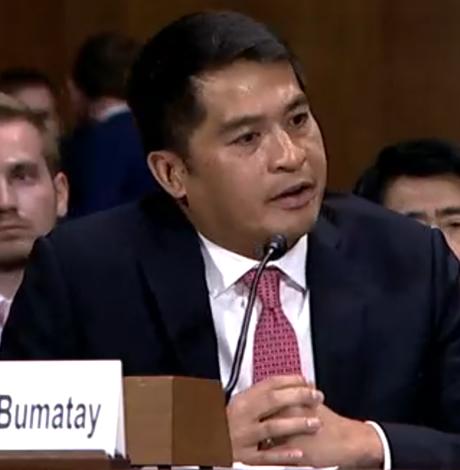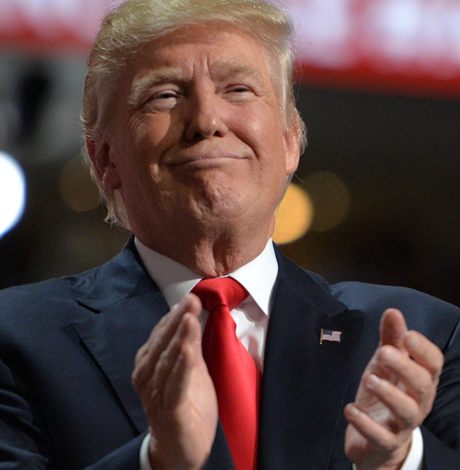homepage news
Trump anti-LGBT judicial nominee cries over accusation he’s anti-LGBT
ABA calls VanDyke ‘not qualified’ in scathing letter
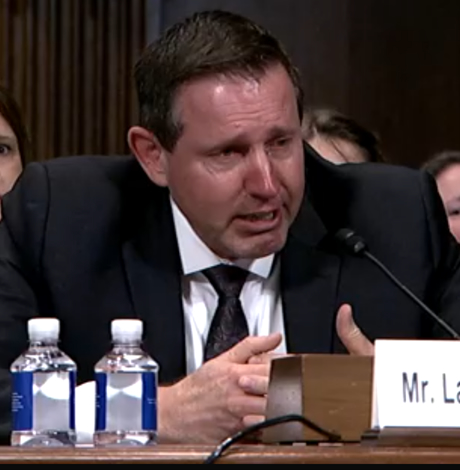
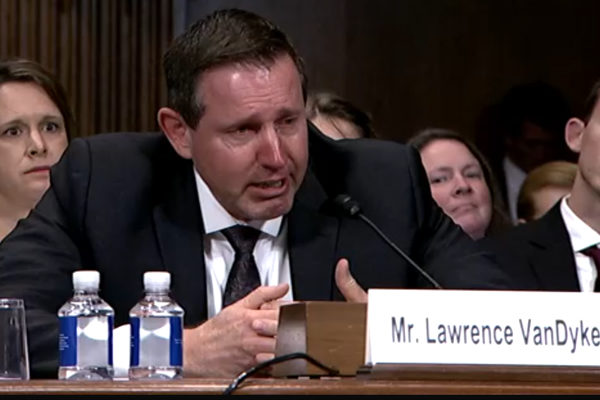
Two of President Trump’s choices for the judiciary — one gay, the other with an anti-gay record — faced questions during their confirmation hearing Wednesday about their fitness for the bench, which led one to break down in tears over assertions he harbors animus toward LGBT people.
Lawrence VanDyke, one of two nominees Trump has selected for open seats on the U.S. Ninth Circuit Court of Appeals, was unable to speak and visibly crying before the Senate Judiciary Committee in response to the American Bar Association’s conclusion he wouldn’t be fair to LGBT people as a judge.
“No, I did not say that,” VanDyke said through tears under questioning from Sen. Josh Hawley (R-Mo.). “I do not believe that.”
“It is a fundamental belief of mine that all people are created in the image of God,” VanDyke said. “They should all be treated with dignity and respect, Senator.”
Asked by Hawley to confirm he’d treat “every living entity” who came before him as a judge with respect and dignity, VanDyke replied, “Absolutely, Senator.”
“I would not have allowed myself to have been nominated for this position if I did not think I could do that, including members of the LGBT community and any other community that has been historically disadvantaged in this country,” VanDyke said.
VanDyke’s public emotional display comes one day after ABA, which evaluates whether judicial nominees are fit for the federal court, went public with a scathing letter that determined he was “not qualified” based on his temperament and animus toward LGBT people.
“Mr. VanDyke’s accomplishments are offset by the assessments of interviewees that Mr. VanDyke is arrogant, lazy, an ideologue and lacking in knowledge of the day-to-day practice including procedural rules,” the letter says. “There was a theme that the nominee lacks humility, has an ‘entitlement’ temperament, does not have an open mind and does not always have a commitment to being candid and truthful.”
LGBT rights were specifically mentioned in the letter. Over the course of interviewing 60 individuals in the legal profession on VanDyke, the ABA said individuals questioned whether the nominee would be fair to LGBT litigants. During the course the interview with VanDyke himself, the nominee “would not say affirmatively that he would be fair to any litigant before him, notably members of the LGBTQ community,” ABA reported.
VanDyke said he was “shocked” to see the conclusion in the letter when it became public last night. The letter provided evidence for progressive groups, such as the Leadership Conference and Civil & Human Rights and People for the American Way, to oppose his confirmation.
Paul Gordon, senior legislative counsel for the People for the American Way, said VanDyke’s emotional display does nothing to change the organization’s views.
“Lawrence VanDyke is not the victim here,” Gordon said. “The victims are the millions of LGBTQ+ people who have shed tears over injustices we have endured. Let’s just say Lawrence VanDyke’s record on LGBTQ rights speaks for itself, and that along with the rest of his record remains disqualifying.”
When asked whether he was aware of the letter before it came out, VanDyke said an ABA member went over it with him shortly beforehand on the same day, but cut him off before he was allowed to respond on the basis that time was short.
VanDyke also said one of his ABA raters, Marcia Davenport, donated to the opponent of his campaign when he ran in 2014 — unsuccessfully — for a seat on the Montana Supreme Court. (Montana is one of the states where members of the Supreme Court are elected by voters at the ballot).
William Hubbard, chair of the ABA Standing Committee on the Federal Judiciary, insisted the ABA evaluation is fair, pointing only out only a small number — three percent — of Trump judicial nominees have received the rating of “not qualified.” (Not a single nominee from President Obama was found “not qualified.”
“The evaluations are narrowly focused, nonpartisan, and structured to assure a fair and impartial process,” Hubbard said. “No nominee gets a ‘not qualified’ rating without another review.”
An ABA spokesperson confirmed Davenport did the initial evaluation and donated money to Michael Wheat, a two-term incumbent whom VanDyke was challenging in the race.
But after Davenport’s initial report, a full committee of 15 ABA members voted in majority for a “not qualified” rating, the ABA spokesperson said. Per standing review procedure, a supplemental review was done and second vote held, the ABA spokesperson added.
The ABA process for determining VanDyke was “not qualified” became a significant point of contention among members of the Senate Judiciary Committee.
On one side was Hawley, who said the ABA letter was “a shameful exercise in political bias” and called on the White House to stop granting the organization access to nominees. On the other side was Sen. Chris Coons (D-Del), who said the opinion of the 60 legal professions ABA consulted was significant.
“They interviewed not one or two or three people who reach conclusions about your lack of professionalism and skills,” Coons said. “But they interviewed 60 people across four states, both judges and attorneys within the practice, and for me that’s fairly damning.”
Sen. Sheldon Whitehouse (D-R.I.) called for Senate hearings on the ABA to get to the bottom of its process of evaluation, saying closed-door sessions would be appropriate — an idea that seemed to have bipartisan traction; although Sen. Mike Lee (R-Utah) said dozens of people who support VanDyke should also be interviewed.
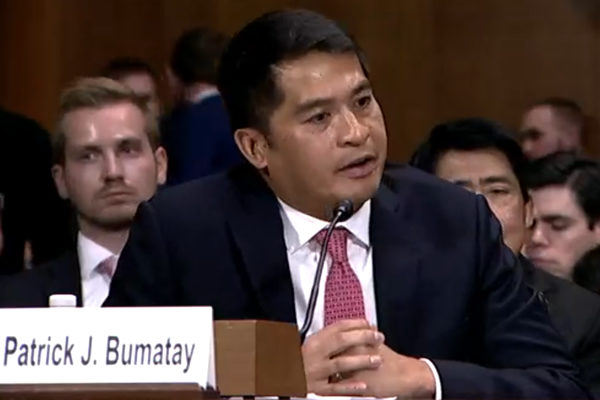
It ended up being convenient for Sen. Lindsey Graham (R-S.C.) to hold VanDyke’s confirmation hearing jointly with the confirmation hearing for Patrick Bumatay, who’s another Trump pick for the Ninth Circuit. Bumatay, who currently works as a U.S. prosecutor in Southern California, is gay.
Graham took advantage of this pairing without explicitly mentioning Bumatay’s sexual orientation.
When Graham asked VanDyke if he knew Bumatay, VanDyke replied, “Well, well.” When Graham asked VanDyke subsequently if he could be fair to him, VanDyke replied, “I would sure hope so. Yes, I would.”
Graham then asked Bumatay whether he also thinks VanDyke would be fair to him. Bumatay signaled his affirmation.
Although VanDyke asserts he’d be fair to LGBT people seeking to have their civil rights affirmed before the judiciary, he has a record that suggests otherwise, including ties to the anti-LGBT legal firm Alliance Defending Freedom.
When LGBT advocates were seeking to attain marriage equality through the federal judiciary, VanDyke, as Montana solicitor general, co-signed friend-of-the-court briefs in 2013 favoring the anti-gay Defense of Marriage Act and state bans on same-sex marriage.
In the same year, VanDyke joined another friend-of-the-court brief before the U.S. Supreme Court in the case of Elaine Photography v. Wilock. Elaine Photography, represented by ADF, was found in violation of New Mexico law after it refused to shoot photos for a wedding for a same-sex couple, represented by University of Pennsylvania law professor Tobias Wolff. (The Supreme Court ended up not taking the case.).
Key to VanDyke’s thinking on this case is an email he wrote at the time and published in the Montana-based Great Falls Tribune.
In the email, VanDyke said the Elaine Photography case was important “because there is a fairly obvious collision course between religious freedom and gay rights” and the litigation “(because it is an extreme case) could be very important in establishing that gay rights cannot always trump religious liberty.”
When Sen. Richard Durbin (D-Ill.) asked VanDyke about the email, VanDyke brought up a different case — Christian Legal Society v. University of California, Hastings — that he said was one of his favorite cases in which he was a part.
“It was a case involving LGBTQ rights, and also involving religious liberty, and I’m so happy to have the role that I had in that case because the position we were in —it was illustrating that there doesn’t have to be a conflict,” VanDyke said.
But VanDyke didn’t represent LGBT interests in that case. Instead, he joined with other lawyers who identified themselves as “gays and lesbians for individual liberty” who argued the Christian Legal Society has a First Amendment right to deny admission to LGBT members and still obtain benefits as an officially recognized school group. (The Supreme Court ended up ruling against Christian Legal Society.)
VanDyke’s record against LGBT rights goes back to the time he was a college student. In 2004, VanDyke as a student at Harvard Law School wrote an op-ed in opposition to same-sex marriage, saying it “will hurt families, and consequentially children and society.”
Sen. Patrick Leahy brought up the op-ed during the confirmation hearing in the context of a response to a question from Sen. Catherine Cortez Masto (D-Nev.). The Vermont Democrat said VanDyke’s response was “kind of flippant” and he cited inadequate research on the issue. (There’s significant research showing gay couples do as well as opposite-sex couples in parenting.)
VanDyke initially responded by saying the Supreme Court has spoken and he wouldn’t allow his personal views to interfere with cases before him. When pressed by Leahy, VanDyke conceded “my personal views have definitely changed since 2004,” but insisted they wouldn’t impact his decision-making at the bench.
Objections to VanDyke on his anti-LGBT record are part and parcel of opposition from progressives to his confirmation. That opposition also includes his opposition to gun regulations, environmental rules and access to abortion. Sen. Dianne Feinstein (D-Calif.) took VanDyke to task during the hearing for an NRA candidate questionnaire he filled out in 2014 indicating opposition to gun control.
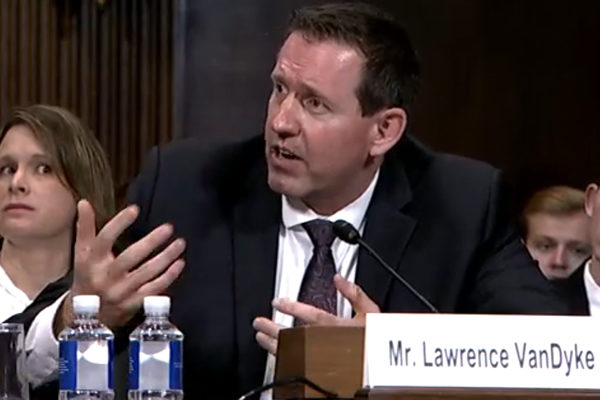
In terms of records, the hearing was more challenging for VanDyke than it was for Bumatay, who didn’t face similar questions. However, both nominees faced objections based on the lack of support from senators from the states they would represent on the Ninth Circuit.
Sens. Kamala Harris (D-Calif.) and Feinstein have withheld their “blue slips” for the Bumatay nomination, while Masto and Sen. Jacky Rosen (D-Nev.) have withheld them for the VanDyke nomination. Traditionally, judicial nominees would only move forward in the Senate if their home state senators provided “blue slips,” but over time, as senators have started to withhold them more often, that practice has been abandoned.
Addressing Bumatay before the committee, Feinstein said she “appreciate[s] the diversity he would being to the bench,” but he has inadequate experience to become a federal appellate judge and the “blue slip” process should be respected.
“This is the fourth time since President Trump took office that the majority has moved forward with a California Ninth Circuit nominee who does not have the support of Sen. Harris or myself,” Feinstein said
Trump nominated Bumatay for the bench after rejecting a list of proposed nominees for the Ninth Circuit seat from Feinstein and Harris. In a role reversal, that prompted Harris — who has a long record as an LGBT advocate — to come out against the openly gay nominee Trump is pushing forward.
A brief exchange between Leahy and Graham on “blue slips” took place after Feinstein. Leahy said when Democrats were in majority in the Senate, Republicans insisted on the process, but have suddenly reversed now that the tables have turned.
Seemingly unmoved by Leahy’s complaint, Graham replied, “I think the blue slip horse has been beaten to death there and people have been all over the board on both sides.”
When Leahy wouldn’t let up on the complaint, Graham reminded him it was former Sen. Harry Reid who changed the process to allow a simple majority vote to confirm judges as opposed to 60 votes to end a filibuster. Leahy retorted that had nothing to do with the “blue slips.”
“That is fallacious, and you know it,” Leahy said.
homepage news
Honoring the legacy of New Orleans’ 1973 UpStairs Lounge fire
Why the arson attack that killed 32 gay men still resonates 50 years later

On June 23 of last year, I held the microphone as a gay man in the New Orleans City Council Chamber and related a lost piece of queer history to the seven council members. I told this story to disabuse all New Orleanians of the notion that silence and accommodation, in the face of institutional and official failures, are a path to healing.
The story I related to them began on a typical Sunday night at a second-story bar on the fringe of New Orleans’ French Quarter in 1973, where working-class men would gather around a white baby grand piano and belt out the lyrics to a song that was the anthem of their hidden community, “United We Stand” by the Brotherhood of Man.
“United we stand,” the men would sing together, “divided we fall” — the words epitomizing the ethos of their beloved UpStairs Lounge bar, an egalitarian free space that served as a forerunner to today’s queer safe havens.
Around that piano in the 1970s Deep South, gays and lesbians, white and Black queens, Christians and non-Christians, and even early gender minorities could cast aside the racism, sexism, and homophobia of the times to find acceptance and companionship for a moment.
For regulars, the UpStairs Lounge was a miracle, a small pocket of acceptance in a broader world where their very identities were illegal.
On the Sunday night of June 24, 1973, their voices were silenced in a murderous act of arson that claimed 32 lives and still stands as the deadliest fire in New Orleans history — and the worst mass killing of gays in 20th century America.
As 13 fire companies struggled to douse the inferno, police refused to question the chief suspect, even though gay witnesses identified and brought the soot-covered man to officers idly standing by. This suspect, an internally conflicted gay-for-pay sex worker named Rodger Dale Nunez, had been ejected from the UpStairs Lounge screaming the word “burn” minutes before, but New Orleans police rebuffed the testimony of fire survivors on the street and allowed Nunez to disappear.
As the fire raged, police denigrated the deceased to reporters on the street: “Some thieves hung out there, and you know this was a queer bar.”
For days afterward, the carnage met with official silence. With no local gay political leaders willing to step forward, national Gay Liberation-era figures like Rev. Troy Perry of the Metropolitan Community Church flew in to “help our bereaved brothers and sisters” — and shatter officialdom’s code of silence.
Perry broke local taboos by holding a press conference as an openly gay man. “It’s high time that you people, in New Orleans, Louisiana, got the message and joined the rest of the Union,” Perry said.
Two days later, on June 26, 1973, as families hesitated to step forward to identify their kin in the morgue, UpStairs Lounge owner Phil Esteve stood in his badly charred bar, the air still foul with death. He rebuffed attempts by Perry to turn the fire into a call for visibility and progress for homosexuals.
“This fire had very little to do with the gay movement or with anything gay,” Esteve told a reporter from The Philadelphia Inquirer. “I do not want my bar or this tragedy to be used to further any of their causes.”
Conspicuously, no photos of Esteve appeared in coverage of the UpStairs Lounge fire or its aftermath — and the bar owner also remained silent as he witnessed police looting the ashes of his business.
“Phil said the cash register, juke box, cigarette machine and some wallets had money removed,” recounted Esteve’s friend Bob McAnear, a former U.S. Customs officer. “Phil wouldn’t report it because, if he did, police would never allow him to operate a bar in New Orleans again.”
The next day, gay bar owners, incensed at declining gay bar traffic amid an atmosphere of anxiety, confronted Perry at a clandestine meeting. “How dare you hold your damn news conferences!” one business owner shouted.
Ignoring calls for gay self-censorship, Perry held a 250-person memorial for the fire victims the following Sunday, July 1, culminating in mourners defiantly marching out the front door of a French Quarter church into waiting news cameras. “Reverend Troy Perry awoke several sleeping giants, me being one of them,” recalled Charlene Schneider, a lesbian activist who walked out of that front door with Perry.

Esteve doubted the UpStairs Lounge story’s capacity to rouse gay political fervor. As the coroner buried four of his former patrons anonymously on the edge of town, Esteve quietly collected at least $25,000 in fire insurance proceeds. Less than a year later, he used the money to open another gay bar called the Post Office, where patrons of the UpStairs Lounge — some with visible burn scars — gathered but were discouraged from singing “United We Stand.”
New Orleans cops neglected to question the chief arson suspect and closed the investigation without answers in late August 1973. Gay elites in the city’s power structure began gaslighting the mourners who marched with Perry into the news cameras, casting suspicion on their memories and re-characterizing their moment of liberation as a stunt.
When a local gay journalist asked in April 1977, “Where are the gay activists in New Orleans?,” Esteve responded that there were none, because none were needed. “We don’t feel we’re discriminated against,” Esteve said. “New Orleans gays are different from gays anywhere else… Perhaps there is some correlation between the amount of gay activism in other cities and the degree of police harassment.”

An attitude of nihilism and disavowal descended upon the memory of the UpStairs Lounge victims, goaded by Esteve and fellow gay entrepreneurs who earned their keep via gay patrons drowning their sorrows each night instead of protesting the injustices that kept them drinking.
Into the 1980s, the story of the UpStairs Lounge all but vanished from conversation — with the exception of a few sanctuaries for gay political debate such as the local lesbian bar Charlene’s, run by the activist Charlene Schneider.
By 1988, the 15th anniversary of the fire, the UpStairs Lounge narrative comprised little more than a call for better fire codes and indoor sprinklers. UpStairs Lounge survivor Stewart Butler summed it up: “A tragedy that, as far as I know, no good came of.”
Finally, in 1991, at Stewart Butler and Charlene Schneider’s nudging, the UpStairs Lounge story became aligned with the crusade of liberated gays and lesbians seeking equal rights in Louisiana. The halls of power responded with intermittent progress. The New Orleans City Council, horrified by the story but not yet ready to take its look in the mirror, enacted an anti-discrimination ordinance protecting gays and lesbians in housing, employment, and public accommodations that Dec. 12 — more than 18 years after the fire.
“I believe the fire was the catalyst for the anger to bring us all to the table,” Schneider told The Times-Picayune, a tacit rebuke to Esteve’s strategy of silent accommodation. Even Esteve seemed to change his stance with time, granting a full interview with the first UpStairs Lounge scholar Johnny Townsend sometime around 1989.
Most of the figures in this historic tale are now deceased. What’s left is an enduring story that refused to go gently. The story now echoes around the world — a musical about the UpStairs Lounge fire recently played in Tokyo, translating the gay underworld of the 1973 French Quarter for Japanese audiences.
When I finished my presentation to the City Council last June, I looked up to see the seven council members in tears. Unanimously, they approved a resolution acknowledging the historic failures of city leaders in the wake of the UpStairs Lounge fire.
Council members personally apologized to UpStairs Lounge families and survivors seated in the chamber in a symbolic act that, though it could not bring back those who died, still mattered greatly to those whose pain had been denied, leaving them to grieve alone. At long last, official silence and indifference gave way to heartfelt words of healing.
The way Americans remember the past is an active, ongoing process. Our collective memory is malleable, but it matters because it speaks volumes about our maturity as a people, how we acknowledge the past’s influence in our lives, and how it shapes the examples we set for our youth. Do we grapple with difficult truths, or do we duck accountability by defaulting to nostalgia and bluster? Or worse, do we simply ignore the past until it fades into a black hole of ignorance and indifference?
I believe that a factual retelling of the UpStairs Lounge tragedy — and how, 50 years onward, it became known internationally — resonates beyond our current divides. It reminds queer and non-queer Americans that ignoring the past holds back the present, and that silence is no cure for what ails a participatory nation.
Silence isolates. Silence gaslights and shrouds. It preserves the power structures that scapegoat the disempowered.
Solidarity, on the other hand, unites. Solidarity illuminates a path forward together. Above all, solidarity transforms the downtrodden into a resounding chorus of citizens — in the spirit of voices who once gathered ‘round a white baby grand piano and sang, joyfully and loudly, “United We Stand.”

Robert W. Fieseler is a New Orleans-based journalist and the author of “Tinderbox: the Untold Story of the Up Stairs Lounge Fire and the Rise of Gay Liberation.”
homepage news
New Supreme Court term includes critical LGBTQ case with ‘terrifying’ consequences
Business owner seeks to decline services for same-sex weddings

The U.S. Supreme Court, after a decision overturning Roe v. Wade that still leaves many reeling, is starting a new term with justices slated to revisit the issue of LGBTQ rights.
In 303 Creative v. Elenis, the court will return to the issue of whether or not providers of custom-made goods can refuse service to LGBTQ customers on First Amendment grounds. In this case, the business owner is Lorie Smith, a website designer in Colorado who wants to opt out of providing her graphic design services for same-sex weddings despite the civil rights law in her state.
Jennifer Pizer, acting chief legal officer of Lambda Legal, said in an interview with the Blade, “it’s not too much to say an immeasurably huge amount is at stake” for LGBTQ people depending on the outcome of the case.
“This contrived idea that making custom goods, or offering a custom service, somehow tacitly conveys an endorsement of the person — if that were to be accepted, that would be a profound change in the law,” Pizer said. “And the stakes are very high because there are no practical, obvious, principled ways to limit that kind of an exception, and if the law isn’t clear in this regard, then the people who are at risk of experiencing discrimination have no security, no effective protection by having a non-discrimination laws, because at any moment, as one makes their way through the commercial marketplace, you don’t know whether a particular business person is going to refuse to serve you.”
The upcoming arguments and decision in the 303 Creative case mark a return to LGBTQ rights for the Supreme Court, which had no lawsuit to directly address the issue in its previous term, although many argued the Dobbs decision put LGBTQ rights in peril and threatened access to abortion for LGBTQ people.
And yet, the 303 Creative case is similar to other cases the Supreme Court has previously heard on the providers of services seeking the right to deny services based on First Amendment grounds, such as Masterpiece Cakeshop and Fulton v. City of Philadelphia. In both of those cases, however, the court issued narrow rulings on the facts of litigation, declining to issue sweeping rulings either upholding non-discrimination principles or First Amendment exemptions.
Pizer, who signed one of the friend-of-the-court briefs in opposition to 303 Creative, said the case is “similar in the goals” of the Masterpiece Cakeshop litigation on the basis they both seek exemptions to the same non-discrimination law that governs their business, the Colorado Anti-Discrimination Act, or CADA, and seek “to further the social and political argument that they should be free to refuse same-sex couples or LGBTQ people in particular.”
“So there’s the legal goal, and it connects to the social and political goals and in that sense, it’s the same as Masterpiece,” Pizer said. “And so there are multiple problems with it again, as a legal matter, but also as a social matter, because as with the religion argument, it flows from the idea that having something to do with us is endorsing us.”
One difference: the Masterpiece Cakeshop litigation stemmed from an act of refusal of service after owner, Jack Phillips, declined to make a custom-made wedding cake for a same-sex couple for their upcoming wedding. No act of discrimination in the past, however, is present in the 303 Creative case. The owner seeks to put on her website a disclaimer she won’t provide services for same-sex weddings, signaling an intent to discriminate against same-sex couples rather than having done so.
As such, expect issues of standing — whether or not either party is personally aggrieved and able bring to a lawsuit — to be hashed out in arguments as well as whether the litigation is ripe for review as justices consider the case. It’s not hard to see U.S. Chief Justice John Roberts, who has sought to lead the court to reach less sweeping decisions (sometimes successfully, and sometimes in the Dobbs case not successfully) to push for a decision along these lines.
Another key difference: The 303 Creative case hinges on the argument of freedom of speech as opposed to the two-fold argument of freedom of speech and freedom of religious exercise in the Masterpiece Cakeshop litigation. Although 303 Creative requested in its petition to the Supreme Court review of both issues of speech and religion, justices elected only to take up the issue of free speech in granting a writ of certiorari (or agreement to take up a case). Justices also declined to accept another question in the petition request of review of the 1990 precedent in Smith v. Employment Division, which concluded states can enforce neutral generally applicable laws on citizens with religious objections without violating the First Amendment.
Representing 303 Creative in the lawsuit is Alliance Defending Freedom, a law firm that has sought to undermine civil rights laws for LGBTQ people with litigation seeking exemptions based on the First Amendment, such as the Masterpiece Cakeshop case.
Kristen Waggoner, president of Alliance Defending Freedom, wrote in a Sept. 12 legal brief signed by her and other attorneys that a decision in favor of 303 Creative boils down to a clear-cut violation of the First Amendment.
“Colorado and the United States still contend that CADA only regulates sales transactions,” the brief says. “But their cases do not apply because they involve non-expressive activities: selling BBQ, firing employees, restricting school attendance, limiting club memberships, and providing room access. Colorado’s own cases agree that the government may not use public-accommodation laws to affect a commercial actor’s speech.”
Pizer, however, pushed back strongly on the idea a decision in favor of 303 Creative would be as focused as Alliance Defending Freedom purports it would be, arguing it could open the door to widespread discrimination against LGBTQ people.
“One way to put it is art tends to be in the eye of the beholder,” Pizer said. “Is something of a craft, or is it art? I feel like I’m channeling Lily Tomlin. Remember ‘soup and art’? We have had an understanding that whether something is beautiful or not is not the determining factor about whether something is protected as artistic expression. There’s a legal test that recognizes if this is speech, whose speech is it, whose message is it? Would anyone who was hearing the speech or seeing the message understand it to be the message of the customer or of the merchants or craftsmen or business person?”
Despite the implications in the case for LGBTQ rights, 303 Creative may have supporters among LGBTQ people who consider themselves proponents of free speech.
One joint friend-of-the-court brief before the Supreme Court, written by Dale Carpenter, a law professor at Southern Methodist University who’s written in favor of LGBTQ rights, and Eugene Volokh, a First Amendment legal scholar at the University of California, Los Angeles, argues the case is an opportunity to affirm the First Amendment applies to goods and services that are uniquely expressive.
“Distinguishing expressive from non-expressive products in some contexts might be hard, but the Tenth Circuit agreed that Smith’s product does not present a hard case,” the brief says. “Yet that court (and Colorado) declined to recognize any exemption for products constituting speech. The Tenth Circuit has effectively recognized a state interest in subjecting the creation of speech itself to antidiscrimination laws.”
Oral arguments in the case aren’t yet set, but may be announced soon. Set to defend the state of Colorado and enforcement of its non-discrimination law in the case is Colorado Solicitor General Eric Reuel Olson. Just this week, the U.S. Supreme Court announced it would grant the request to the U.S. solicitor general to present arguments before the justices on behalf of the Biden administration.
With a 6-3 conservative majority on the court that has recently scrapped the super-precedent guaranteeing the right to abortion, supporters of LGBTQ rights may think the outcome of the case is all but lost, especially amid widespread fears same-sex marriage would be next on the chopping block. After the U.S. Tenth Circuit Court of Appeals ruled against 303 Creative in the lawsuit, the simple action by the Supreme Court to grant review in the lawsuit suggests they are primed to issue a reversal and rule in favor of the company.
Pizer, acknowledging the call to action issued by LGBTQ groups in the aftermath of the Dobbs decision, conceded the current Supreme Court issuing the ruling in this case is “a terrifying prospect,” but cautioned the issue isn’t so much the makeup of the court but whether or not justices will continue down the path of abolishing case law.
“I think the question that we’re facing with respect to all of the cases or at least many of the cases that are in front of the court right now, is whether this court is going to continue on this radical sort of wrecking ball to the edifice of settled law and seemingly a goal of setting up whole new structures of what our basic legal principles are going to be. Are we going to have another term of that?” Pizer said. “And if so, that’s terrifying.”
homepage news
Kelley Robinson, a Black, queer woman, named president of Human Rights Campaign
Progressive activist a veteran of Planned Parenthood Action Fund

Kelley Robinson, a Black, queer woman and veteran of Planned Parenthood Action Fund, is to become the next president of the Human Rights Campaign, the nation’s leading LGBTQ group announced on Tuesday.
Robinson is set to become the ninth president of the Human Rights Campaign after having served as executive director of Planned Parenthood Action Fund and more than 12 years of experience as a leader in the progressive movement. She’ll be the first Black, queer woman to serve in that role.
“I’m honored and ready to lead HRC — and our more than three million member-advocates — as we continue working to achieve equality and liberation for all Lesbian, Gay, Bisexual, Transgender, and Queer people,” Robinson said. “This is a pivotal moment in our movement for equality for LGBTQ+ people. We, particularly our trans and BIPOC communities, are quite literally in the fight for our lives and facing unprecedented threats that seek to destroy us.”
The next Human Rights Campaign president is named as Democrats are performing well in polls in the mid-term elections after the U.S. Supreme Court overturned Roe v. Wade, leaving an opening for the LGBTQ group to play a key role amid fears LGBTQ rights are next on the chopping block.
“The overturning of Roe v. Wade reminds us we are just one Supreme Court decision away from losing fundamental freedoms including the freedom to marry, voting rights, and privacy,” Robinson said. “We are facing a generational opportunity to rise to these challenges and create real, sustainable change. I believe that working together this change is possible right now. This next chapter of the Human Rights Campaign is about getting to freedom and liberation without any exceptions — and today I am making a promise and commitment to carry this work forward.”
The Human Rights Campaign announces its next president after a nearly year-long search process after the board of directors terminated its former president Alphonso David when he was ensnared in the sexual misconduct scandal that led former New York Gov. Andrew Cuomo to resign. David has denied wrongdoing and filed a lawsuit against the LGBTQ group alleging racial discrimination.

-

 State Department4 days ago
State Department4 days agoState Department releases annual human rights report
-

 South America2 days ago
South America2 days agoArgentina government dismisses transgender public sector employees
-

 District of Columbia2 days ago
District of Columbia2 days agoCatching up with the asexuals and aromantics of D.C.
-

 Politics4 days ago
Politics4 days agoSmithsonian staff concerned about future of LGBTQ programming amid GOP scrutiny

